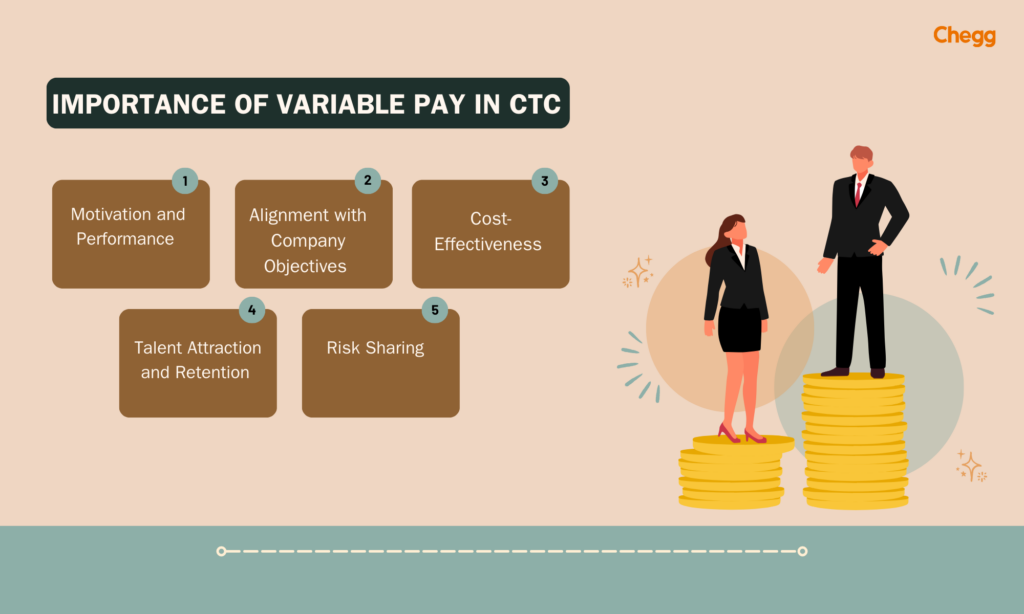What Is Variable Pay in CTC? A Complete Guide for 2025


Quick Summary
- Many companies offer variable pay as bonuses or incentives to reward employees.
- Variable pay is performance-based and impacts salary negotiations.
- It helps boost employee motivation and encourages retention.
- Common types include incentives, bonuses, and recognition programs.
- Organizations use variable pay to appreciate and retain top talent.
Table of Contents
In today’s competitive job market, understanding the various components of a salary package is essential for employees when evaluating job offers. One important component that often plays a key role is variable pay. So, what is variable pay in CTC?
Variable pay in CTC refers to the portion of an employee’s salary that fluctuates based on specific factors such as individual performance, company profits, or sales targets. Unlike fixed pay, which remains constant every month, variable pay can change depending on the employee’s contributions or the organization’s financial health. This flexible pay structure is becoming increasingly common and forms a significant part of many salary packages.
Understanding variable pay in CTC is crucial for employees to accurately assess the overall value of their compensation and make informed decisions about their financial future. Knowing how it is calculated and how it affects your total earnings can help you negotiate better during job offers or salary discussions.

What Is Variable Pay in CTC?
Variable pay in CTC is the portion of an employee’s salary that depends on their performance, productivity, or the company’s financial success. Unlike fixed pay, which is guaranteed every month, variable pay can fluctuate based on specific criteria, such as meeting sales targets, achieving certain business outcomes, or reaching individual performance goals.
For example, if an employee exceeds their performance targets or the company meets its profit benchmarks, they may receive a higher variable pay as part of their total compensation package. This type of pay structure motivates employees to perform better, as their earnings are directly linked to their contributions and the company’s success.
Variable pay in CTC is an essential part of the overall CTC salary components, particularly in roles where performance can be easily measured, such as sales or management positions. It is commonly referred to as performance-based pay, rewarding employees for achieving or surpassing expectations set by the organization.
👉 Related Read :- Variable Pay in CTC
Why Is Variable Pay Important in CTC?
From the company’s perspective, variable pay in CTC serves several important purposes that contribute to both employee motivation and overall business growth.

1. Motivation and Performance:
- Incentive to achieve goals: Variable pay ties employee compensation directly to their performance and the company’s success. This creates a strong incentive for employees to work harder and achieve their targets.
- Recognition of exceptional effort: It rewards employees who go above and beyond their job duties, recognizing and appreciating their contributions.
2. Alignment with Company Objectives:
- Shared goals: Variable pay can be structured to align with the company’s strategic objectives, ensuring that employees are motivated to work towards the same goals.
- Improved efficiency: By linking compensation to desired outcomes, variable pay can drive more efficient and effective work practices.
3. Cost-Effectiveness:
- Flexibility: Variable pay allows companies to adjust compensation based on business performance and economic conditions, providing flexibility in managing costs.
- Reduced fixed costs: By incorporating variable pay, companies can reduce their fixed labor costs, improving their financial health.
4. Talent Attraction and Retention:
- Competitive compensation: Attractive variable pay packages can help companies attract and retain top talent in a competitive job market.
- Employee satisfaction: It can enhance employee satisfaction and loyalty, reducing turnover costs and improving morale.
5. Risk Sharing:
- Shared responsibility: Variable pay can create a sense of shared responsibility between the company and its employees, as both parties benefit from the company’s success.
- Reduced risk: By linking compensation to performance, companies can mitigate the risk of paying for underperformance.
Why Should Employees Pay Attention to Variable Pay in CTC?
When evaluating job offers, employees should carefully consider the importance of variable pay in CTC. While fixed pay provides financial stability, variable pay can significantly increase total earnings based on individual or company performance. During salary negotiations, it’s essential for employees to understand the variable CTC meaning, how the variable pay component is calculated, and what criteria need to be met to receive the maximum possible amount. A well-structured variable pay system can boost overall compensation and provide more earning opportunities.

Components of CTC: Fixed Pay vs Variable Pay
CTC (Cost to Company) is the total cost incurred by an employer to hire and retain an employee. It includes both fixed pay and variable pay components.
1. Fixed Pay
This is the guaranteed portion of your salary that remains the same every month, regardless of your performance or company profits. It includes:
- Basic Salary: The core salary paid to the employee, typically monthly or bi-weekly.
- Allowances: Additional payments provided to cover specific expenses, such as:
- House Rent Allowance (HRA): To contribute towards housing costs.
- Conveyance Allowance: For transportation expenses.
- Medical Allowance: To reimburse medical expenses.
- Leave Encashment: Payment for unused leaves.
2. Variable Pay
This component fluctuates based on the employee’s performance, the company’s performance, or other predefined criteria. It includes:
- Performance-Based Incentives: Bonuses or commissions tied to individual or team performance metrics.
- Profit-Sharing: A portion of the company’s profits are distributed to employees.
- Stock Options: The right to purchase company shares at a predetermined price.
- Retention Bonuses: Payments to encourage employees to stay with the company for a specified period.
- Overtime Pay: Extra compensation for working beyond regular hours.
When understanding salary structures in India, it is important to be aware of the various components that make up a CTC. For official insights and regulations regarding compensation and employment standards, you can refer to the Ministry of Labour & Employment, Government of India, which provides comprehensive information on labor laws and salary norms.
Differences Between Fixed Pay and Variable Pay in CTC
When reviewing your CTC salary structure, it’s important to understand the distinction between fixed pay and variable pay, as both play crucial roles in determining your total compensation. Here’s a quick comparison of fixed vs variable pay:
| Feature | Fixed Pay | Variable Pay |
|---|---|---|
| Definition | Guaranteed salary that remains the same each month. | Fluctuates based on performance, business goals, or company profits. |
| Stability | Guaranteed, regardless of performance or company results. | Uncertain, dependent on individual or company performance. |
| Risk | Offers little risk as employees are guaranteed a fixed income. | Employees can be at risk of earning less if they don’t meet their targets or company earns losses. |
| Motivation | May not motivate employees to perform better. | Can motivate employees to work harder and achieve better results. |
| Budgeting | Allows employees to budget their expenses. | This can make it difficult for employees to budget. |
| Examples | Salary, annual wage, monthly stipend. | Commissions, bonuses, profit sharing, stock options. |
👉 Related Read – Negotiate Beyond Your Current CTC
Examples of Variable Pay in CTC
Variable pay in CTC can take many forms, each designed to reward employees for their individual contributions or the company’s overall performance. Here are a few common examples of variable pay:
1. Performance-Based Bonus
Employees may receive an additional bonus if they exceed their performance targets for a specific period, such as a quarter or year. This is typically linked to measurable achievements like exceeding sales targets, increasing productivity, or meeting specific key performance indicators (KPIs).
Example: If a salesperson surpasses their quarterly sales target by 20%, they may receive a performance-based bonus as part of their variable pay in CTC.
2. Commission
In many sales roles, employees earn a commission based on the sales they generate. This type of performance-based pay directly links earnings to an employee’s ability to bring in revenue for the company.
Example: A salesperson receives 5% of the sales they generate in a month, which becomes part of their variable pay.
3. Profit Sharing
Some companies offer profit-sharing schemes where employees receive a portion of the company’s profits, often on a quarterly or annual basis. This serves as an incentive for employees to contribute to the company’s growth and success.
Example: At the end of the fiscal year, a company distributes 10% of its profits among its employees as a profit-sharing bonus.
👉 Also Read :- Understanding the Salary Slip
How is Variable Pay Calculated in CTC?
Understanding how to calculate variable pay in CTC is essential for employees to grasp how much they can earn beyond their fixed salary. Companies typically calculate variable pay based on specific performance criteria. Here’s a step-by-step explanation of how to calculate variable pay in CTC:
Step 1: Define the Criteria for Variable Pay
The first step in calculating variable pay is to clearly define the criteria that the employee needs to meet. These criteria could be based on individual performance, such as meeting sales targets, completing projects, or achieving specific business goals. In some cases, variable pay can also be linked to company-wide metrics like overall profits or revenue growth.
Step 2: Measure the Employee’s Performance Against the Set Criteria
Once the criteria are defined, the employee’s performance is assessed. For example, if the target is to increase sales by 15%, the employee’s actual sales figures are compared to this target. If the employee surpasses the target, they qualify for a higher portion of their variable pay.
Step 3: Calculate the Percentage of Variable Pay Based on Performance
After assessing performance, the next step is to calculate the variable pay amount. Companies often set a percentage of the CTC as the variable pay. This percentage can increase if the employee exceeds the target or decrease if the target isn’t met.
Example Calculation:
If an employee’s CTC is ₹5,00,000 and their variable pay is set at 15% of CTC, the potential variable pay would be ₹75,000 if they meet the set performance criteria. If the employee exceeds their performance target, they might receive more than the calculated amount.
👉 Recommended Read – How to Perform Basic Salary Calculation
Benefits of Variable Pay for Employees and Employers
Variable pay in CTC offers several advantages for both employees and employers, creating a win-win situation where both parties can benefit from a performance-driven work culture. Here’s a breakdown of the key benefits for each:
1. Benefits for Employees
- Opportunity to Earn More Based on Performance One of the primary benefits for employees is the opportunity to earn more than a fixed salary. By exceeding targets or achieving specific performance goals, employees can increase their earnings through bonuses, commissions, or other forms of variable pay. This extra earning potential can be a significant motivator.
- Encourages Personal and Professional Growth Variable pay encourages employees to improve their skills and performance. When compensation is tied to results, employees are more likely to take initiative, develop their capabilities, and contribute to the organization’s success. This leads to overall growth in their career and skill set.
2. Benefits for Employers
- Encourages a High-Performance Work Culture Employers to benefit from variable pay as it promotes a high-performance work culture. By rewarding top performers, companies foster a competitive and productive environment, where employees are driven to achieve their best. This can lead to improved overall performance and efficiency across the organization.
- Aligns Company Goals with Employee Performance Variable pay aligns individual goals with the company’s broader objectives. By linking compensation to company success, such as meeting revenue targets or increasing profitability, employees become more invested in the company’s overall performance. This alignment helps ensure that employees are working toward common business goals.
Variable pay in CTC is beneficial for both employees and employers because it creates a performance-driven work environment that rewards excellence and drives business success.
Negotiating Variable Pay in CTC
Negotiating variable pay during job interviews or salary discussions can have a significant impact on your overall compensation. Here are some useful tips for successfully negotiating variable pay in CTC:
Tip 1: Ask for a Clear Breakdown of How Variable Pay is Calculated
Before accepting a job offer, it’s essential to understand how the variable pay portion is calculated. Ask the employer for a detailed explanation of the criteria that determine the variable component—whether it’s based on sales targets, personal performance metrics, or company profits. This transparency will help you gauge how achievable the targets are and how much you can expect to earn.
Tip 2: Negotiate for a Higher Percentage of Variable Pay if You Feel Confident in Your Ability to Perform
If you are confident in your abilities and believe you can exceed the set performance goals, you may want to negotiate for a higher percentage of variable pay. This is especially relevant in roles where performance is easily measurable, such as sales, project management, or leadership positions. Negotiating a higher percentage can significantly increase your overall earnings.
When you’re doing CTC salary negotiation, ensure you understand the conditions under which it is awarded and how it impacts your total compensation. It’s also helpful to understand whether the variable pay is discretionary or tied to performance targets.
For more information on negotiating variable pay and understanding CTC, visit “Learning’s Salary Negotiation Tips.”
Conclusion
In conclusion, understanding what is variable pay in CTC is and how it affects your overall compensation is crucial for both employees and employers. By recognizing the distinction between fixed pay and variable pay, employees can make informed decisions when evaluating job offers or salary packages. It’s important to consider both components—fixed and variable—when assessing the total value of a salary package.
For employees, variable pay offers the potential to earn more based on performance, which can serve as a powerful motivator for personal and professional growth. For employers, it aligns employee performance with company goals, fostering a high-performance culture that drives business success.
Evaluate numerous career choices to choose the right career path for yourself. Dive into our Guide on Career Advice.
Frequently Asked Questions: (FAQs)
Q1: Is variable pay good or bad?
Ans. Variable pay can be good as it motivates employees to perform better and aligns their goals with company success. However, it can be bad if overly reliant on performance metrics, causing stress or uncertainty.
Q2: Is variable pay included in CTC? Or Is variable pay part of CTC?
Ans. Yes, variable pay is included in the Cost to Company (CTC). It forms part of the overall compensation package, alongside fixed salary and benefits, reflecting the total cost to the employer.
Q3: How to calculate variable pay in salary?
Ans. Variable pay is usually a percentage of the basic salary or linked to performance targets and company profits. It rewards employees based on achievements, ensuring incentives align with business success and individual contributions to the organization.
Q4: Is variable pay guaranteed in CTC?
Ans. No, variable pay in CTC is performance-based and depends on achieving specific goals like sales targets or company profits. It is not a fixed part of the salary and is given as incentives or bonuses based on individual or company performance, making it uncertain but rewarding.
Q5: What is the current variable CTC means?
Ans. Current variable CTC refers to the performance-based part of your total salary at present. It includes bonuses and incentives, which depend on individual performance and business conditions. Unlike fixed salary, it can change based on targets achieved and company profitability.
Related Read:
To read more related articles, click here.
Got a question on this topic?